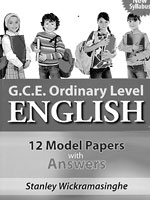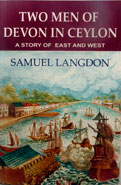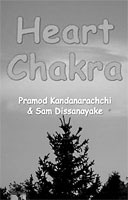How early should we start developing our English language skills? It is never too soon. In today’s global village a basic knowledge of the English language is indispensable. However, many do not realize the importance of it until it is too late. Instead of waiting to learn English at university or at the point of entering the job market, obtaining a firm grasp of the language much earlier would be beneficial. Thus, excelling in the Ordinary Level English examination would certainly be a stepping stone towards fluency in the language.
 |
With the view of improving the pass rates of the Ordinary Level English examination and facilitating the teaching and learning process, Stanley Wickramasinghe, former Senior Lecturer in English at the English Teachers’ College, Maharagama recently published a book for O’Level students titled “GCE Ordinary Level English Language – 12 Model Question Papers with Answers”. Based on the G.C.E local Ordinary Level syllabus, this book promises to be a useful tool for students. It is well structured and each unit comprehensively covers vocabulary, reading, writing and language functions.
“The book is designed closely with the syllabus and the themes addressed are the same themes dealt with at the exams too, such as environment, water, sports etc” assures Stanley Wickramasinghe. He has also been careful to design the book in keeping with the prototype questions suggested by the National Evaluation and Testing Services of the Department of Examinations and incorporated the techniques mentioned in the prototype paper in this book.
The answers too are included at the end of the book thus making it a handy self-study guide as well as enabling parents to help their children with their work.
The author believes that this book would be helpful to teachers as well as they would find the materials they need in one book. The book which is in the form of model papers and exercises provides the students with much practice in using the language before they sit for their examination. The author suggests that after the completion of each unit, the book could be used as extra practice in the classroom or even as home work.
Stanley Wickramasinghe is not only experienced in teaching the language, but has also published books before on the same subject. His first book was ‘G.C.E Ordinary Level English 10 model question papers with answers’. He has also published workbooks for Grades 9, 10 and 11 based on their prescribed texts which are approved by the Educational Publications Advisory Board, Ministry of Education.
“Working on improving English from a young age would render the students proficient in the language by the time they reach the Ordinary Level classes” he adds and suiting his actions to his words, he is currently preparing model papers for grades 6, 7, 8,9,10 and 11. He hopes the complete series will be out within the next two months. His books are approved by the Educational Publications Department.
What prompted him to write and publish these books? Well it was the case of someone who decided he would put his knowledge and skills to good use in rendering a service to his motherland. In 1983/1984 Mr. Wickremasinghe obtained the Lancaster Scholarship and studied testing techniques and this book is his effort to use that knowledge for the benefit of the teachers and students in Sri Lanka.
The book priced Rs. 490 is now available at bookshops.
Menika and a story of Colonial times
Two men of Devon in Ceylon was first published in London in 1898. Authored by Rev. Samuel Langdon, the first principal of Richmond College, Galle, it is set in the Portuguese era in Sri Lanka (then Ceylon), with Menika, a native chieftain’s daughter as its leading character.
The story is told by Jan Withycomb, a resident of Devon in South Western England about his experiences in Ceylon along with his brother Bob.
The author, Rev. Langdon had arrived in Ceylon as a Methodist missionary in 1870 and begun his teaching career at Wesley College, Colombo.
He later went onto become the first Principal of Richmond College serving there from 1876-1879 and helped to steer the school through the crucial period of initial development.
The book was re-printed this year by S.P.A. Dayaratna; a publisher of antiquarian books which he hopes will be read by adults and children alike. “The book is an exposure to the English language and will take a reader back in history to an era when the country was under Colonial rule, “he said.
He had received a copy of the book from a friend in Scotland and after reading it decided to reprint it. “The whole idea of re-printing this book is to make it available mainly for school children in the country,” said Mr. Dayaratna, who has a passion for books.
“Two men of Devon in Ceylon” is available at all leading book stores and is priced at Rs. 800.
Getting into the heart of violence
Book facts: Heart Chakra by Pramod Kandanarachchi & Sam Dissanayake.
Published by Lulu Marketplace. Reviewed by Dr. Janak B. Abayakoon
Heart Chakra is the story of a youth named Rohan, who happened to be, as fate would decree, an innocent spectator of extreme violence in his homeland. He was in no way involved in the horrific violence that was unleashed. This was the manifestation of the social injustice, inequality, and the geopolitics which engulfed the island nation in varied forms over a period of nearly three decades.
After migrating to Canada he encountered a vibrant society, radically opposite to what he had grown up in. His first visit back home during the last stage of fighting, to attend his brother’s wedding sounded like a trip of a life time, but to his horror, turned into a living nightmare with misery and humiliation. Rohan's story is as shocking as it is pitiful.
Both the JVP and LTTE insurrections in Sri Lanka had provided ample opportunities for law enforcement authorities, self-centred politicians and the underworld goons to take the law into their own hands and unleash unprecedented violence which caused shockwaves in all levels of society, as well as mental and physical agony in the hearts and minds of a vast majority of the people of the country over the past four decades.
The authors have done an extremely arduous job of eliciting these stories as well as including different perspectives of individual beliefs, by introducing a plethora of characters from different social back grounds-- the North Eastern war zone in Sri Lanka to those prevailing in cosmopolitan enclaves in the South.
This book is available globally at lulu.com, amazon.com, barnesandnobles.com and other online bookstores. I hope this novel would soon be published in Sri Lanka.
The authors should be congratulated for an excellent job done under trying circumstances.
|




